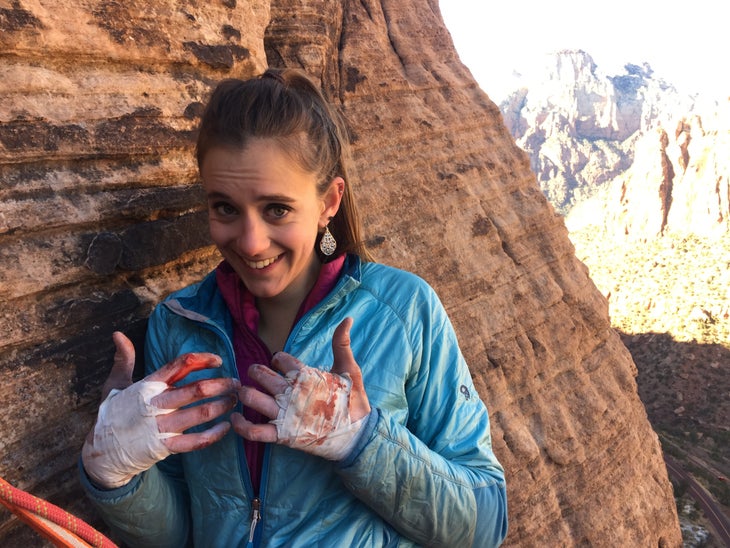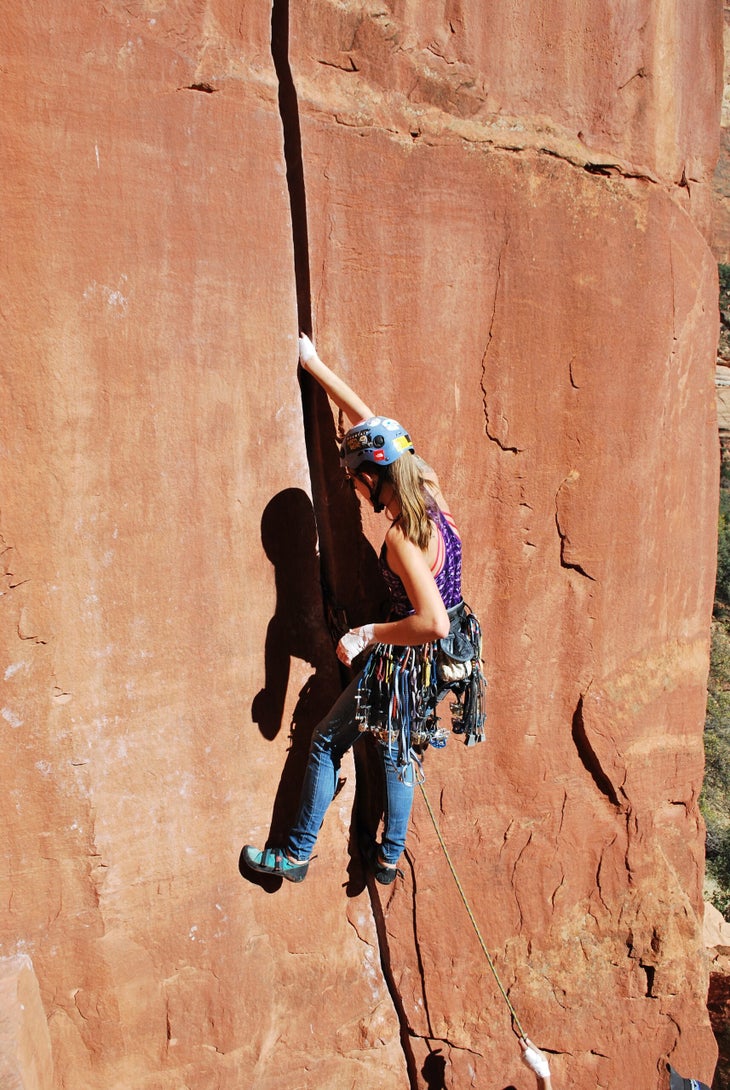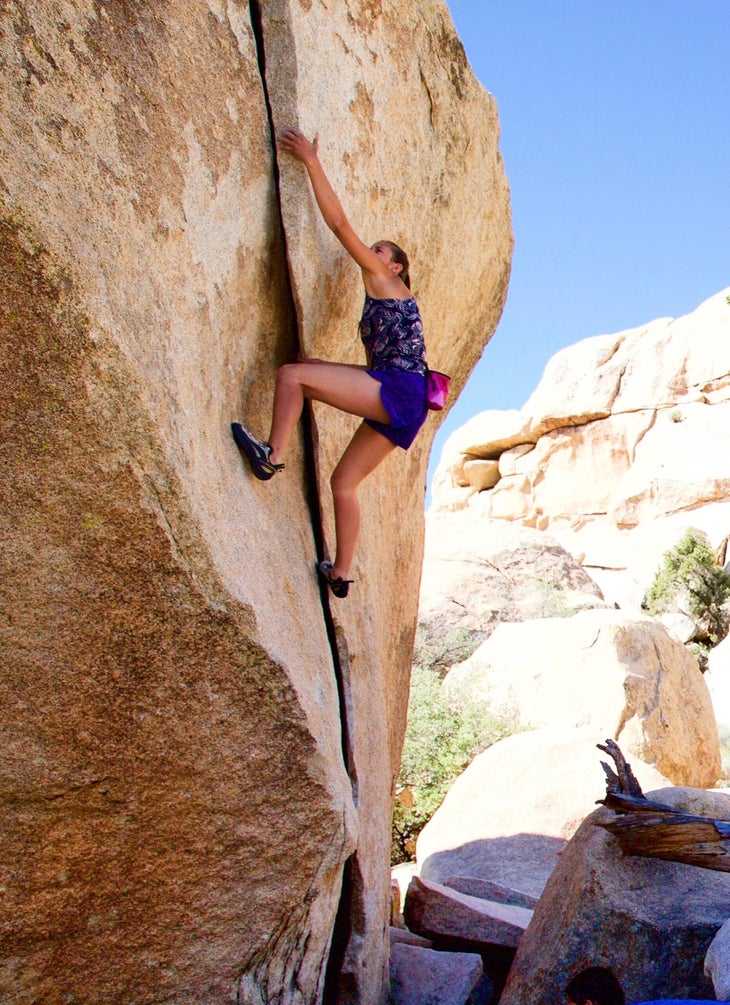"It Felt Like An Exorcism": Fallon Rowe on Writing Her Memoir of Climbing, Abuse, and Survival

In the past few years, the climbing community has seen several harrowing stories of violence and abuse come to light in the news. Formerly prominent climbers like rapist Charlie Barrett, domestic abuser Lonnie Kauk, and child rapist Alex Fritz have proven that celebrated individuals in the climbing world can still act as predators for many years. Last spring, the organization Never Solo was founded to address abuse in climbing specifically, calling the climbing community “tight-knit” and emphasizing the need to understand how toxic and violent behavior shows up in our spaces. Now, a new climbing memoir offers an insightful and deeply personal perspective to surviving abuse.
In Pay No Mind, set to release on November 25, Utah climber Fallon Rowe recalls her experience with (and ultimate escape from) a controlling and dangerous partner. The story follows Rowe (rhymes with now), then a 19-year-old geology student in northern Utah. When her charismatic new boyfriend convinces her to empty her savings and fly to Patagonia to climb the iconic Fitz Roy, Rowe finds herself fighting for her autonomy, independence, and survival both on and off the mountain.
Read an exclusive excerpt of Rowe’s debut here, then check out our conversation below.
Climbing: Why did you decide to write this story into a memoir? And why now?
Fallon Rowe: Some stories will eat you alive as a writer until you finally relent and force them out onto the page. What happened to me was so dark and transformative, I knew I had to write it into a book. It’s an almost unbelievable series of events. I had no other way to explain to people what happened to me since it was so wild.
I started working on the manuscript right after I escaped in 2017, but my ex-partner threatened me when he learned about the project, so it simmered on the back burner for years. In 2022, I had a paid summer off from my job as a full-time high school science teacher, which allowed me to sit down and write the entire book in around six weeks. It felt like an exorcism to finally let it all out, like some kind of insane release. I spent the last few years querying agents and publishers. In spring 2025, I finally got the email every new author dreams about: the publishing offer for Pay No Mind from Di Angelo Publications.
Climbing: Pay No Mind shows the dark side of following a more experienced climbing partner into the mountains—something many climbers can relate to doing. After surviving the events of this book, how do you now evaluate new potential partners?
Rowe: I know red flags to look for now in potential romantic or climbing partners. Before taking on a serious objective together, I know how important it is to be on the same page and be properly prepared. When I evaluate new climbing partners, of course the bare minimum is safety and competency. Beyond that, I prefer to climb with folks who have a positive attitude in the face of challenges, who are good communicators, and who are understanding of my health problems.

Climbing: Have you returned to Patagonia since the events of Pay No Mind? Do you intend to?
Rowe: I haven’t, and I don’t intend to. That’s not the kind of climbing I’m interested in anymore. If I had the opportunity someday, it would be fun to go back just to hike and make better memories since it’s a beautiful landscape.
Climbing: In your story, you alternate between feeling free and feeling trapped. You write, “Freedom cannot be given or received; you must reach out, grab it, and hold on like hell.” What are the steps you take in your daily life to preserve or expand upon this freedom?
Rowe: I keep freedom in mind every day. Honoring your autonomy is an important part of Stoic philosophy, which informs every part of my life. When I was in the abusive relationship and climbing partnership detailed in Pay No Mind, I lost myself and my independence. I’ll never let that happen again. I have an extremely strong sense of identity, and I’m always examining my life—checking that I’m making decisions that align with my goals and values.
I can’t stand feeling trapped or stifled, so I’m mindful of setting up my life in a way that leads to freedom. I try to have jobs, relationships, and interests that allow me to live in an unbridled way, so I can explore and express myself however I want. Where I choose to live is also a key part of this. I love southern Utah. I can go off into the desert to climb, run, hike, camp, and just exist without anyone bothering me. It’s like the wild West. Totally free.
Climbing: What was the hardest part about writing this story?
Rowe: Getting over the fear of my ex coming after me for sharing the story. That’s no longer a concern, which has been a relief.
Otherwise, it was very difficult to put myself back in the mindset of my nineteen-year-old self. There’s a lot of vulnerability when writing from the perspective of your younger self. I’m not that girl anymore, but to do the story justice, I had to be true to the person I used to be, no matter how much I judge or disagree with her decisions now. It’s scary to admit to the things I allowed to happen, to the ways I was complicit … but ultimately, I had to tell the whole truth, and get over myself. I hope readers know that’s not who I am anymore, but I’m not ashamed either.
Climbing: Besides being a climber and writer, you juggle a lot of different jobs. What are they, and how do you find the time to write?
Rowe: Since I quit teaching, my career has been a mosaic of my interests. Right now, I’m working full-time at an outdoor gear shop, but I’m looking for a regular remote gig so I have more stability and flexibility—ideally as a writer, but who knows what will happen. In addition to that, I run a climbing coaching business called Sage Sending, which is extremely rewarding. I’m a climbing guide; I teach trad and crack climbing clinics. I write blogs for another guiding company in Zion. I’m an athlete for a few climbing brands, so I always have sponsorship duties to complete. I do freelance graphic design and cartography for a development firm. I’m also a climbing photographer. I’m the Vice President of the St George Climbers Coalition, and I serve on the board for The Highpointers Foundation. I also sometimes contract with Conserve Southwest Utah as a geoscience researcher and writer. It sounds crazy when I list it all out like that, but I somehow juggle it all.
My daily schedule is typically random. I have my set work shifts, and then I fill in the gaps with everything else—writing, training, climbing, trail running, appointments, emails, dating, meetings, and coaching calls. My calendar looks totally ridiculous. But it’s important for me to have time for other interests as well, like reading books, playing fiddle, chess, and billiards, and practicing archery, Spanish, and Latin. I have a full, stimulating life. I think most people waste a large portion of their time and their intellectual and athletic potential.
Finding time to write is more of a compulsion than a decision. My brain tells me when it’s time to write, and then it is unstoppable, no matter what else I’m ‘supposed’ to be doing. I’m writing a novel right now, which I’m thrilled about, and a book on climbing mental performance. My priorities are being the best climber I can be, taking care of my body (I have multiple chronic illnesses), living true to my philosophy, and writing whenever possible.

Climbing: You mentioned in your afterword that you have other stories you want to tell. What about this one inspired you to tackle it first?
Rowe: This story was a simple choice because it stands out as one of the defining eras of my life. There’s a before and there’s an after, like a big dividing line in my development. I also felt a strange mental block, like I had to write this before my brain would allow the floodgates to open for other projects, almost like I owed it to myself to finish this first. Now I feel like I can finally move on, and my creativity is back.
Climbing: You have a tattoo of the coordinates to City of Rocks, Idaho. How would you describe City of Rocks to someone who’s never visited?
Rowe: City of Rocks is a quiet wonderland of granite tucked away in the Idaho countryside. It’s packed with gray crystalline domes and fins of rock in a huge labyrinth with trees, sagebrush, creeks, and trails scattered throughout. The weather is fickle. The rock is perfectly grippy with incredible patina crimps, neat cracks, and demanding technical climbing that is often spooky or ‘old school’ in nature. It’s my favorite place ever—home.
Climbing: Legendary Yosemite Stonemaster John Long wrote the foreword to your book. How did he get involved in your publishing process, and what was it like to work with him?
Rowe: Sequoia Schmidt, the owner of Di Angelo Publications, is friends with John, and he’s published a number of titles through them. She told me that they’d only publish my memoir if I agreed to work with him on revisions first. I was over the moon at the opportunity to learn from a legend! I’ve looked up to him since I was seven years old. It felt surreal to get to work with him during our months of meetings and revisions. Initially, I was nervous, but he’s become an amazing friend through the process. He was truly perfect for me as a mentor on this project because of his skill as a writer, knowledge about climbing, familiarity with addiction and mental illness, and wisdom about abuse and toxic relationships. He showed incredible compassion for my story and struggles, and has been a key supporter in my life this year.
During the revision process, I appreciated his straightforward feedback. He doesn’t waste time. Cuts through the crap. He has a very raw, simple style. Somehow ruthless and gentle simultaneously. His biggest focus was on expanding the internal storytelling—showing more of my emotions and thoughts to help readers connect with me. He also helped me incorporate more narrative shift—including flashbacks or stories from my younger years, and also occasional insights from my current self. I’m extremely grateful for his help, and honored that he wrote the foreword to my book.
Climbing: Now that this project is finished, what does Patagonia represent to you?
Rowe: A large portion of the story occurred in Patagonia, so of course I’ll always associate those memories with it. It’s epic and intimidating, stunning and dramatic. To me, it represents a turning point in my life and climbing. I never thought I’d get to visit a place like that, and once I did, it was like the world opened up to me.

Climbing: In the past few years, climbing has seen a few high-profile stories of violence and abuse from prominent male climbers, including Charlie Barrett and Lonnie Kauk. What do you think people in the climbing community can do to help counteract this problem and support potential survivors?
Rowe: I think the climbing community is largely wonderful, but unfortunately, there are problematic and dangerous characters in every space. We all need to do our part to root out misogyny, abuse, and other unacceptable behaviors. Any time people see something, they should say something (if it’s safe to do so) or report it if needed. Recognizing when there’s something bad or sketchy happening, and then not tolerating it, is a good start. We can call each other out, we can look out for our friends and community members, and we can challenge one another to do better (with our language and our actions). We can make it clear that the climbing world will not tolerate abuse or violence. We should focus our concern on the people who have been harmed, protect them, and trust their stories. There are far too many detrimental misconceptions about victims, and unnecessary blame or mistrust of their experiences. Changing the culture will take time and bravery. Charlie and Lonnie were unique cases because they both had power and status to shelter them, but I think most abusers are a lot more low-profile, hiding within the ranks, like my ex, so we need to stay vigilant.
To support survivors, resources are often the biggest issues, whether that’s financial to help them get out and live on their own, or access to things like therapy. They need to have a safety net in place so they feel no need to go back to their abuser. Friends can provide support by listening without judgment, by giving them safe places to stay, and by defending them online if they choose to speak out. We can all try to make our crags and gyms welcoming places.
Excerpted from Fallon Rowe’s debut novel, Pay No Mind: A Memoir of Climbing, Abuse, and Survival © 2025 Di Angelo Publications. Reprinted with permission. Pay No Mind is available for pre-order at https://www.diangelopublications.com/shop/p/pay-no-mind until release on November 25, 2025.